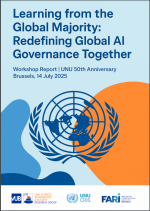Guimaraes Moraes, Thiago
- Internet Governance and Multistakeholder Processes
- AI Regulatory Sandboxes and Responsible Innovation
- AI Governance and Data Protection
- LLM in Law & Technology – Tilburg University (Netherlands)
- MSc in Information Sciences – University of Brasília (UnB, Brazil)
- BSc in Law and BSc in Network Engineering – University of Brasília (UnB, Brazil)
Thiago Guimarães Moraes is a Brazilian PhD Fellow at UNU-CRIS and VUB, conducting research on the use of "by design" approaches—such as privacy by design, ethics by design and legal protection by design —to foster responsible innovation and safeguard fundamental rights in Artificial Intelligence (AI) regulatory sandboxes (AIRS). He is pursuing a joint-degree PhD in Law through an agreement between the University of Brasília (UnB) and Vrije Universiteit Brussel (VUB). His research is supervised by Prof. Dr. Gloria González Fuster (VUB) and Prof. Dr. Alexandre Kehrig Veronese (UnB).
In addition to his academic pursuits, Thiago serves as a Specialist in Data Protection and AI Governance at the Brazilian Data Protection Authority (ANPD). Previously, he held key roles within ANPD, including as Coordinator of Innovation and Research and as its first Data Protection Officer.
Thiago is also a co-founder and council member of the Laboratory of Public Policy and Internet (LAPIN), a Brazilian civil society organization dedicated to advancing digital policy. His active participation in Internet Governance Forums at global and national level since 2018 has deepened his understanding of multistakeholder processes as vital tools for addressing complex challenges in digital governance.
With an interdisciplinary background in Law and Technology, Thiago’s research bridges these fields to explore regulatory sandboxes—controlled environments for innovation that facilitate collaboration among regulators, innovators, and other stakeholders. His PhD aims to develop actionable recommendations for designing AIRS that enable responsible innovation while ensuring robust protections for fundamental rights. He believes that developing a multistakeholder methodology that include civil society engagement in AIRS is essential to achieve these goals.


